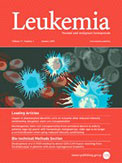Creutzig U, Zimmermann M, Bourquin JP, Dworzak MN, Kremens B, Lehrnbecher T, von Neuhoff C, Sander A, von Stackelberg A, Schmid I, Starý J, Steinbach D, Vormoor J, Reinhardt D. Leukemia. 2012 Apr;26(4):654–61. doi: 10.1038/leu.2011.267. Epub 2011 Oct 4. IF: 9.561

Department of Paediatric Haematology and Oncology
Abstract
Infants <1 year of age have a high prevalence of prognostically unfavorable leukemias and a presumed susceptibility to treatment-related toxicities. A total of 125 infants with acute myeloid leukemia (AML) were treated in studies AML-BFM-98 (n = 59) and –2004 (n = 66). Treatment regimens of both studies were comparable, consisting of intensive induction followed by four courses (mainly high-dose cytarabine and anthracyclines). Allogeneic-hematopoietic stem-cell-transplantation (allo-HSCT) in 1st remission was optional for high-risk (HR) patients. Most infants (120/125=96%) were HR patients according to morphological, cytogenetic/molecular genetic and response criteria. Five-year overall survival was 66 ± 4%, and improved from 61 ± 6% in study-98 to 75 ± 6% in study-2004 (P(logrank) 0.14) and event-free survival rates were 44 ± 6% and 51 ± 6% (P(logrank) 0.66), respectively. Results in HR infants were similar to those of older HR children (1–<2- or 2–<10-year olds, P(logrank) 0.90 for survival). Survival rates of HSCT in 1st remission, initial partial response and after relapse were high (13/14, 2/8 and 20/30 patients, respectively). The latter contributes to excellent 5-year survival after relapse (50 ± 8%). Despite more severe infections and pulmonary toxicities in infants, treatment-related death rate was identical to that of older children (3%). Our data indicate that intensive frontline and relapse AML treatment is feasible in infants, toxicities are manageable, and outcome is favorable.
-Michaela Kotrová-